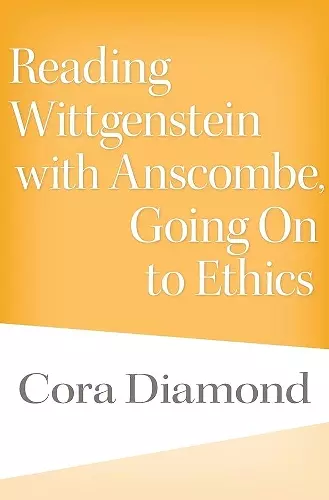Reading Wittgenstein with Anscombe, Going On to Ethics
Format:Hardback
Publisher:Harvard University Press
Published:22nd Feb '19
Should be back in stock very soon

In Reading Wittgenstein with Anscombe, Going On to Ethics, Cora Diamond follows two major European philosophers as they think about thinking, as well as about our ability to respond to thinking that has miscarried or gone astray. Acting as both witness to and participant in the encounter, Diamond provides fresh perspective on the importance of the work of these philosophers and the value of doing philosophy in unexpected ways.
Diamond begins with the Tractatus (1921), in which Ludwig Wittgenstein forges a link between thinking about thought and the capacity to respond to misunderstandings and confusions. She then considers G. E. M. Anscombe’s An Introduction to Wittgenstein’s Tractatus (1959), in which Anscombe, through her engagement with Wittgenstein, further explores the limits of thinking and the ability to respond to thought that has gone wrong. Anscombe’s book is important, Diamond argues, in challenging contemporary assumptions about what philosophical problems are worth considering and about how they can be approached. Through her reading of the Tractatus, Anscombe exemplified an ethics of thinking through and against the grain of common preconceptions. The result drew attention to the questions that mattered most to Wittgenstein and conveyed with great power the nature of his achievement.
Diamond herself, in turn, challenges Anscombe on certain points, thereby further carrying out just the kind of ethical work Wittgenstein and Anscombe each felt was crucial to getting things right. Through her textured engagement with her predecessors, Diamond demonstrates what genuinely independent thought is able to achieve.
Cora Diamond’s work on the Tractatus is insightful, original, and stimulating; it has been deservedly influential. In this collection, she pursues new themes and deepens the exploration of others. Of particular interest are the fresh connections she draws between reflections on the Tractatus and issues in moral philosophy, where her rich and exciting work has been a game-changer for many. -- Alexander George, Amherst College
It is becoming increasingly evident to many that Elizabeth Anscombe’s writings on Wittgenstein are just as wonderful as the rest of her work. This book shows what is less appreciated: that Cora Diamond is one of our finest readers of both Wittgenstein and Anscombe. -- James Conant, University of Chicago
These excellent essays are crucially important in elucidating central questions in the works by Wittgenstein and Anscombe, two of the most important philosophers of the twentieth century. The issues discussed here are fundamental: how we are to understand thoughts, forms of words, and uses of language that relate to our self-understanding, but cannot fit the template we instinctively bring to bear on how language and thought are related to reality. -- James Doyle, Harvard University
In times in which analytic philosophy needs to look at its history, an inspired practitioner of the discipline such as Diamond is a wonderful guide. She is one of the most original contemporary philosophical voices and this is an unusual book, out of step with the massification of academic work in philosophy…It is philosophy at its truest. -- Sofia Miguens * Wittgenstein Studies *
Elucidates and extends Anscombe’s findings. This is required reading for scholars of Wittgenstein, Anscombe, and analytic metaphysics and ethics. * Choice *
It is Diamond’s highly original reading of Ludwig Wittgenstein that stands out as her most important and perhaps most lasting contribution…The essays are quite demanding but the fruits gleaned by their engagement are well worth the effort. -- Jonathan Tran * Modern Theology *
ISBN: 9780674051683
Dimensions: unknown
Weight: unknown
344 pages